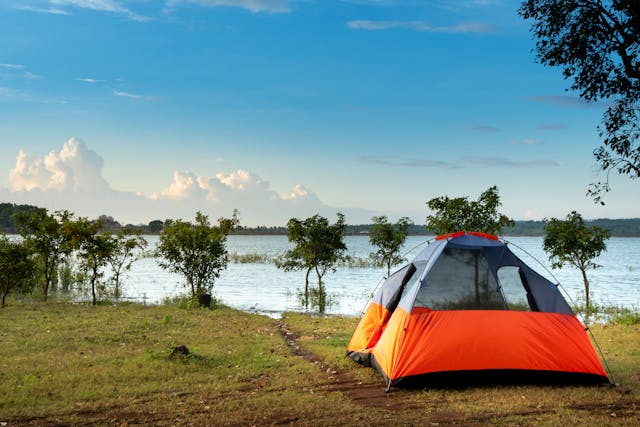Your cart is currently empty!

Camping Etiquette: Be a Respectful Guest in the Great Outdoors
With nearly 88 million camping households in the U.S., campgrounds can sometimes feel like bustling neighborhoods. But unlike your home environment, etiquette is essential for ensuring everyone enjoys a peaceful and relaxing experience in nature. Whether you’re a seasoned camper or a newbie embarking on your first adventure, brushing up on camping etiquette is key to being a respectful guest in the wilderness.
Leave No Trace: Your Guiding Principle
The golden rule of camping is to leave no trace. This means minimizing your impact on the environment and ensuring the campsite remains pristine for future visitors. Here’s how to embody this principle:
Pack It In, Pack It Out:
Everything you bring into the campsite, from food and gear to trash, must leave with you. Dispose of all waste properly in designated bins and avoid littering. Remember, what you leave behind not only detracts from the beauty of the outdoors but can also harm wildlife.
Dishwashing Done Right:
Avoid washing dishes directly in streams or lakes. Use a washbasin with biodegradable soap and scatter the strained dishwater away from your campsite. Consider a multi-bucket system for a more efficient and eco-friendly cleaning process.
Be Mindful of Fire Rings:
When building a campfire, only use designated fire rings. Never create new fire pits, as this damages the natural environment. Extinguish your fire completely before leaving your campsite. Douse the embers with water and stir the ashes until cool to the touch.
Respect the Designated Space
Campgrounds typically have designated campsites marked with numbers and tags. Always check for available sites and avoid occupying one that appears reserved. Look for established tent spots – these areas are typically flat, free of debris, and show minimal signs of previous use.
Campsite Capacity:
Most campsites have limitations on the number of tents and people allowed. A typical site can accommodate two tents and a maximum of 6-8 people. If you have a large group, secure enough campsites to comfortably fit everyone. Respecting capacity limits prevents overcrowding and protects the surrounding natural environment.
Backcountry Bliss:
When camping in undeveloped areas, choose existing campsites whenever possible. This minimizes your impact on fragile ecosystems and allows the local flora to flourish.
Fire Safety: A Shared Responsibility
Campfires are a cherished part of the camping experience. However, wildfires pose a significant threat, so fire safety is paramount.
-
Know Before You Go: Always check fire restrictions before heading out. Fire bans may be in effect due to dry conditions or other factors. Never light a fire if a ban is in place.
-
Designated Fire Rings: Only build fires in designated fire rings. These are constructed to contain flames and minimize the risk of spreading fire.
-
Extinguish Thoroughly: Never leave your campfire unattended. Extinguish it completely before leaving your campsite. Douse the embers with water, stir the ashes, and ensure everything is cool to the touch.
-
Alternatives to Fire: If fire bans are in effect, consider alternative sources of light and ambiance. Solar-powered lanterns or string lights are great eco-friendly options that enhance your campsite without the risk of fire.
Wildlife: Observe from a Distance
Encountering wildlife is a highlight of any camping trip. However, it’s crucial to observe animals from a safe distance. Getting too close can not only threaten your safety but also disrupt the animal’s natural behavior.
-
Respectful Observation: Enjoy wildlife from a safe distance. Utilize binoculars for a closer look without disturbing the animals.
-
Never Feed Wildlife: Feeding wild animals can lead to habituation, making them dependent on human handouts and potentially increasing the risk of conflict.
-
Proper Food Storage: Securely store all food, trash, and toiletries to avoid attracting wildlife to your campsite. In bear country, utilize bear boxes or bear canisters to keep food and attractants out of reach.
Be a Considerate Camper: Sharing the Outdoors
Camping etiquette extends beyond respecting the environment and wildlife. Being mindful of your fellow campers ensures everyone has a peaceful and enjoyable experience.
-
Respect Quiet Hours: Most campgrounds have designated quiet hours, typically from late evening to early morning. Minimize noise during this time by keeping music at a reasonable volume and avoiding loud conversations.
-
Respectful Campsite Boundaries: Avoid walking through other campsites. Treat other campers’ spaces with the same respect you would your own home.
-
Leash Your Pets: Always keep your pets leashed for their safety and the safety of others. Clean up after your pet promptly to maintain a clean and enjoyable environment for everyone.
Embrace the Joys of Responsible Camping
By following these camping etiquette guidelines, you can ensure a memorable and positive experience for yourself and those around you. Remember, responsible camping allows us to enjoy

Leave a Reply